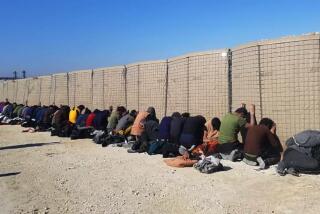Troops Train Sights on Shiite Militia in Iraq
- Share via
NAJAF, Iraq — In a major campaign to quell rebellious Shiite forces, U.S. troops and tanks seized a government compound from militiamen loyal to an anti-American cleric Thursday and then fought pitched battles with his followers east of this holy city.
U.S. military officials said at least 40 militiamen were killed in the third day of skirmishes in four cities, in an offensive aimed at putting pressure on and eventually ejecting and arresting Shiite cleric Muqtada Sadr. The death toll for Sadr’s followers in the last week was about 120, according to the U.S.
Occupation authorities also named a new governor for Najaf, a direct challenge to Sadr’s attempts to control the city.
The fighting in Najaf sent plumes of smoke over the edge of the holy city and forced residents to hide in their homes for hours as helicopter gunships hovered overhead.
For more than a month, the U.S. military has confronted rebellions on two fronts: Sunni insurgents based in Fallouja in central Iraq west of Baghdad, and the takeover of city halls, police stations and holy sites in several major towns in south-central Iraq by Sadr’s Al Mahdi army.
After days of intense battle, the U.S. Marines withdrew last week from Fallouja and turned security over to a new Iraqi force whose leaders once were loyal to Saddam Hussein. This week, U.S. military commanders turned their attention to Sadr’s militia, the other major front in the war for control of Iraq.
The operation in Najaf on Thursday afternoon by the U.S. Army’s 1st Armored Division followed coordinated strikes on Sadr positions in Diwaniya, Karbala and Kufa aimed at routing his militiamen and seizing their arms caches.
U.S. Army Brig. Gen. Mark Hertling said his forces were successful on both scores. He said they then moved into Najaf to secure the governor’s offices and surrounding buildings that Sadr’s men had taken over about a month ago.
The government compound was seized Thursday without a fight. Separately, troops and armor moved on to the eastern side of the Euphrates River, across from the populated areas of Najaf and its suburb, Kufa, in what Hertling called a feint to draw militiamen out of the city.
Militia fighters ambushed the American forces twice along the eastern side of the river, Hertling said, but the militia took heavy casualties. No Americans were killed, the general added.
“Across the board, our strategy has been to eliminate the militias,” Hertling said Thursday night. “In every one of the cities, we’ve published announcements saying, ‘Lay down your arms and you won’t be injured.’ In none of these cases have they laid down their arms. They continue to attack.”
The move on the governor’s headquarters brought U.S. tanks and troops to within about two miles of the city center and its religious shrines. Hertling reiterated that the U.S. was determined not to approach the shrines, an act that would enrage much of Iraq’s majority Shiite population. Shiite leaders said Tuesday that Sadr must withdraw his militia from the shrines, where he has been stockpiling arms.
After the compound was secured, U.S. troops in armored vehicles patrolled the area’s streets, strafing buildings with gunfire to drive out remnants of Sadr’s Al Mahdi militia. The actions pinned residents in their homes.
Sadr is not very popular among ordinary Najaf residents, and several interviewed Thursday said they wanted the siege to end and to be rid of the black-clad militiamen whom they describe as swaggering through their streets.
Shiite leaders have sent delegations to try to persuade Sadr to back down from his confrontation with occupation forces in favor of a political solution. He has refused to budge.
Ali Aliassari, the head of the Najaf police force, said in an interview Thursday that he believed the latest such attempt at mediation by a group of tribal leaders could soon bear fruit to “quench the fires of sedition.”
As the military offensive pressed ahead, the top civilian occupation authority in Iraq made it clear that his patience with Sadr was running out. He cast the cleric as an outlaw who had misused holy sites to launch a rebellion in his self-interest.
“Over the past few months, one man and armed elements under his control have spread lawlessness, fear and economic paralysis, especially in Najaf and Karbala,” L. Paul Bremer III, head of the Coalition Provisional Authority, said in Baghdad.
“These lawless elements, who attempt to advance the interests of one group at the expense of everyone else, have engaged in armed attacks ... have occupied and looted public and private property by force of arms ... have fired mortars from the courtyard of the mosque in Kufa,” Bremer said. “This must stop.”
Bremer made the comments as he announced the appointment of Adnan Zurufi as the new governor for Najaf. Zurufi, who is returning to Iraq after a decade in exile in Saudi Arabia, will become the top civilian authority in Najaf if Sadr can be brought under control. Zurufi called on Sadr’s militia to disarm and disband.
Meanwhile, the U.S. military Thursday retracted its statement that three American soldiers had been killed Tuesday in the city of Diwaniya. Instead, two soldiers were injured there, the military said.
*
Salman reported from Najaf and McDonnell from Baghdad. Times staff writer Tracy Wilkinson in Baghdad contributed to this report.
More to Read
Sign up for Essential California
The most important California stories and recommendations in your inbox every morning.
You may occasionally receive promotional content from the Los Angeles Times.













